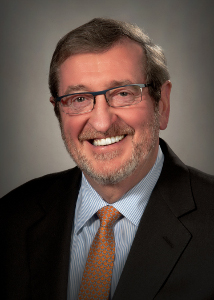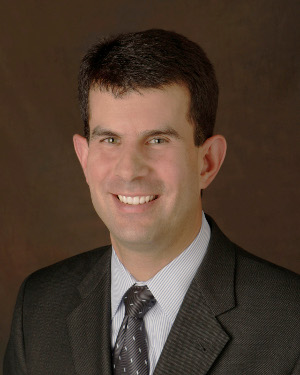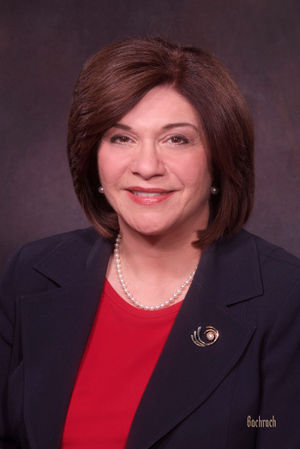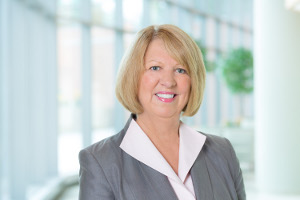Four health system and hospital CEOs from around the country shared their New Year's resolutions, anticipated challenges, goals for 2015 and essential leadership qualities with Becker's Hospital Review.
Participants
Michael Dowling, president and CEO of North Shore-LIJ Health System (Great Neck, N.Y.)
David Grauer, administrator and CEO of Intermountain Medical Center (Murray, Utah).
Christine Schuster, RN, MBA, president and CEO of Emerson Hospital (Concord, Mass.)
Sandra Bruce, MHA, president and CEO of Presence Health (Chicago).
Question: What are some of your health system or hospital's New Year's resolutions? And what are some of your resolution s as a CEO?
s as a CEO?
Michael Dowling: As a health system, to me, an important goal is to continue to stay positive and upbeat while healthcare is transitioning to the new business model. There is so much negativity today, so it's important to have an optimistic outlook and to believe we can get things done.
My personal resolution is to try to have a better balance between continuous work and taking care of myself. This year I want to stay heal thy and go to the gym more. I tell everyone they should be doing this too.
thy and go to the gym more. I tell everyone they should be doing this too.
David Grauer: A resolution is defined as something new and never before done. Intermountain Healthcare has been focusing on essentially the same goals for a long time — we don't have dramatically new goals. At a high level, we are continuing to focus on being a model healthcare system at an affordable cost, and we make goals around how to do this.
Christine Schuster: For the hospital, we are really striving to implement our new vision, which is about caring for the community  and working with our physician and community partners. Our other resolution is to be agile and pivot in response to market changes and changing regulations. It's about being more flexible with non-traditional business models.
and working with our physician and community partners. Our other resolution is to be agile and pivot in response to market changes and changing regulations. It's about being more flexible with non-traditional business models.
As a CEO, my resolution is to complete our strategic planning process to ensure our community has great healthcare for years to come. I call it "taking care of the 100-year questions" — making sure in 100 years from now everyone will have great healthcare. Also, I want to make sure Emerson is the best place to come for care, and also to work, with a culture that supports great patient care and a great place for our staff.
 Sandra Bruce: As always, our primary focus will remain on the community and the patients we serve. At the end of the day, the success of any healthcare system is really just the sum of the tens of thousands of individual human interactions that take place every day with our patients across all our ministries. In other words, we earn our stripes one patient at a time. This means easier access to care, more convenience and personal attention for every patient. We are in the service business, yet most Americans have an easier time interacting with their credit card company than their health care system. This needs to change.
Sandra Bruce: As always, our primary focus will remain on the community and the patients we serve. At the end of the day, the success of any healthcare system is really just the sum of the tens of thousands of individual human interactions that take place every day with our patients across all our ministries. In other words, we earn our stripes one patient at a time. This means easier access to care, more convenience and personal attention for every patient. We are in the service business, yet most Americans have an easier time interacting with their credit card company than their health care system. This needs to change.
Of course, we will also be focused on the tectonic shifts in the healthcare landscape. I think of 2015 as a kind of bridge year for us. In the three years since our formation, we have constructed a new operating model, expanded our provider network and improved our clinical quality. 2015 is about getting all the final pieces in place to fulfill our vision of full implementation of clinical integration and population health.
Finally, we want to celebrate and empower our staff who are the drivers of all of this transformation. I'm inspired on a daily basis by their dedication and skill. So, my personal resolution is to make sure our team understands how much their work is appreciated and be constantly on the lookout for ways to empower them further.
Q: What are some of the biggest challenges you anticipate for your hospital or health system in 2015?
M.D.: I think the biggest challenge is managing the multiplicity of continuous change that's going on, while at the same time preserving that which we shouldn't change. We need to get all of our employees to understand why change is important and necessary, and to have cultural adaptability. You have to be able to roll with the punches these days, and you have to be quick enough to take advantage of opportunities when they present themselves.
D.G.: There are two major areas that will challenge us. We will be focusing on shared accountability, which is, in essence, Intermountain Medical Center's approach to be an accountable care organization. We are focusing on evidenced-based medicine, engaging patients and aligning costs to achieve our mission of high-quality care at an affordable cost. The other main challenge is the implementation of Cerner EHR across the entire Intermountain system over the next year — all hospitals, clinics and facilities.
C.S.: It's really continuing to manage the shift from inpatient to outpatient, and with that, innovating and staying ahead of the curve; to try new things and take some risk so we are ahead of the pack, developing alternative sources of revenue.
S.B.: Managing through the transformation at the right pace and balance will be important. Competition is intensifying and coming from non-traditional places. To survive and thrive, we first need to stay focused on the fundamentals, such as controlling costs, keeping a steady eye on the balance sheet and making smart investments. We will also need to look outward by developing new partnerships and networks with insures, physicians, community groups and social services to better serve customers. Our goal is turn our challenges into opportunities.
Q: What are you most looking forward to in the year ahead?
M.D.: The opportunity to move the ball downfield. We've made a lot of progress but there is room for a lot more improvement. I like to continually change; I don't like being stagnant. I look forward to delivering better healthcare, focusing more on population health and, in many ways, turning the way we operate upside down without causing massive upheaval.
D.G.: I'm looking forward to a successful implementation of Cerner EHR, because I really do think it will help us be more efficient and effective in serving our patients.
C.S.: We have a lot to look forward to. First, we will open our new Center for Rehabilitative & Sports Therapies and our Cantu Concussion Center, a 16,000-square-foot innovative multidisciplinary rehab center. It will offer pediatric and geriatric care and all sorts of programs. We've been able to fundraise $2 million of the $3 million from the community. We've also signed an agreement with Blue Cross Blue Shield of Massachusetts to implement a telemedicine pilot. We are looking toward how we can use telemedicine to better care for chronic care patients and help keep them out of the hospital.
I'm also excited to continue working with our physicians to align goals between them and the hospital. Now, more than ever before, we have to be in lock-step with physicians — the future will be a 'united we stand, divided we fall' scenario. I'm looking forward to it, because the ones who benefit are our patients.
S.B.: Most exciting for me will be seeing what, for decades, has been an abstract idea become reality. People like me, who've been in the industry for a while, have long wondered how such a transformation would work in practice. Like an old Polaroid photo that slowly comes into focus, the face of healthcare reform will become a lot sharper and more vivid by the end of 2015. That's exciting on a personal level. At Presence, we’re looking forward to moving the ball forward on clinical integration and creating more access points for patients and serving them in new ways. We’re squarely focused on building new bridges to a whole range of constituencies including the public sector and community groups, which will be key to treating the whole patient.
Q: What do you believe is the most essential factor for achieving a successful population health management program and why?
M.D.: I think you have to have a good structure inside the organization and good care management. An area that's often neglected when dealing with population health is the non-medical side, like social, behavioral, lifestyle and mental health. Many of the issues that affect health have little or no connection to the medical side of peoples' lives. You have to realize this if you want to have a long-term, sustainable effect on peoples' lives. This isn't really talked about since we're in the medical care business, but we need to be in the health management business, especially when you're treating people from different economic groups.
D.G.: I think there are three key elements to successful population health: evidenced-based medicine, engaging patients (through shared decision making, personalized care and education) and aligning financial incentives (through physician payment, panels and networks and our own insurance products). Everything has to be aligned to ensure we are focusing on value for the patient, rather than volume. I'm excited for the transition.
C.S.: We are deeply clinically affiliated with Partners HealthCare in Boston. We're working with them very closely to implement population health management programs. That will continue.
There are three elements of a successful population health management program. 1) You have to have really good, useful patient information that will inform the clinical decision-making. That means you have to have IT systems that talk to each other and that are integrated within the whole network of care. 2) You need a strong primary care network. The PCP has to be quarterback of the care delivery team. They have to be able to play offense and defense. We also have to start incorporating nonclinical staff roles into this model. 3) There needs to be patient engagement and community integration. Patients have to play a much more active role in their health and wellness and not just go to the doctor's office when they're sick. You also need to be working with the community; no longer being a functional silo but working with the community to keep people in their homes by supporting them socially and economically. It takes a 'medical' village.
S.B.: Obviously, there are many skill sets a health system needs to be successful in a population health model. First, we must create convenience and easily accessible primary care. We must be good at clinical data management. We must be good at creating the right financial structures and incentives. Most importantly, we must understand and address the healthcare disparities in the communities we serve.
But I think the overarching principle that must guide our work in these areas is to have a nimbleness and a flexibility to make adjustments along the way. A lot of this is brand new territory and we must be willing to adapt as we go. We need to create a learning environment that is measuring results at every step and having the discipline to adjust.
Q: What do you think is the most important leadership quality?
M.D.: The ability to inspire. To get people excited. To get them to want to do something, not because they have to, but because they want to. To create an environment where people wake up in the morning and look forward to coming to work. And finally to build a team and interdisciplinary approach to how we handle issues.
D.G.: Emotional intelligence, which I would describe as the ability to connect with people, build relationships, establish trust and empathy and motivate people to do the best work they can. To me, that's how you do it.
C.S.: Listening and bringing people together around a common goal. If you put the patient in the center of everything, it's very easy to have a dialogue. As a chief executive, the most important thing you can do is listen to your staff, patients and community, and that helps inform my decisions. Taking that approach has never let me down.
S.B.: I think the best leaders have an innate ability to answer the two primary questions that are on everyone’s mind in any organization. Where are we going? How are we going to get there? Leaders are responsible for rallying the organization around an agreed-upon objective. It’s not only about getting the team organized and aligned; but about getting them excited about the journey. The new healthcare landscape will favor those organizations that are bold, innovative and courageous. That takes a team of passionate people who understand the vision. This is job number one of any CEO.
Q: How would you describe your leadership style?
M.D.: I think my style, in many ways, is about working around people and being very participatory. The key to leadership is to be able to identify the leadership abilities in everyone who works with you in the organization, and to allow them to realize, expose and take advantage of their own talents. Face-to-face time is also important to me, as is being visible. Don't hide in your office. When people say it's lonely at the top it's because they don't get out to look around.
D.G.: I hope my style is one of high emotional intelligence. I think the role of the hospital administrator is often chief cheerleader. We want to have talented people who feel empowered and motivated to do their work, and also hold them accountable. Leadership is about creating the structure that allows them to do this.
C.S.: I asked my team during a meeting and they described my leadership style as inclusive, collaborative, team-oriented and results-oriented. I think, being a nurse, you always learn to work as a team, and I was also very active in sports growing up. I can't imagine being in a job where you don't work with a lot of people. The best part of the job is tackling all of these challenges with a group of people who share a passion for patient care.
S.B.: I’d like to think that I bring an openness and transparency. I’m a big believer that it’s best to lay everything out on the table. It's really the only way to create a truly collaborative atmosphere. I think this is the most challenging times to work in healthcare – but it's also most exhilarating time to work in healthcare. The team at Presence is such a remarkable collection of talent that I find it thrilling to come to work.
Q: Who is your biggest inspiration as a leader and why?
M.D.: The person I read a lot about is [Winston] Churchill. He was an unbelievable leader who took positions contrary to those most people in his country took at the time, but he made a huge impact on the world as we know it. He had his ups and downs but he always moved forward, even when he failed. Also, President Franklin Delano Roosevelt. When you look historically at leaders and the world that they lived in, the difficulties they encountered makes the things we deal with today seem pretty minor. This historical perspective is important.
C.S.: My dad, who passed away nine years ago, used to own a small pharmacy. When I was a little kid I used to go to work with him and it always impressed me how he always put the patient who came in for medicine at the center. He also had to have a retail part of the store to make money. He had a soda fountain, he sold seasonal things; ultimately, he kept the store alive by being innovative and creative.
I currently have a board member, Mike Zak, who is a partner at Charles River Ventures. What I love about Mike is that he constantly challenges me to be innovative, take risks and have the courage to try creative things. He's a mentor in many ways and I feel the hospital and our community have benefited from him challenging me, and subsequently me challenging my team and always pushing the envelope. He taught me it's okay to try things even if they don't work, but in the end, they usually do. That's why we've been so successful.
S.B.: My biggest inspiration is Sister Carol Keehan, president and CEO of the Catholic Health Association of the United States. She had the courage to stand up for her convictions to help bring about the passage of the Patient Protection and Affordable Care Act. I admire her strength in standing up for what she believed and she has been applauded across the United States for having secured the necessary votes.